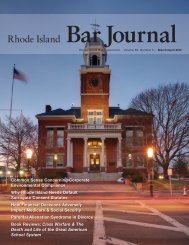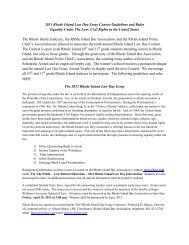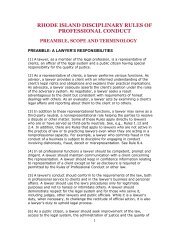Are We Taking The Sex Offender Label Too Far? - Rhode Island Bar ...
Are We Taking The Sex Offender Label Too Far? - Rhode Island Bar ...
Are We Taking The Sex Offender Label Too Far? - Rhode Island Bar ...
Create successful ePaper yourself
Turn your PDF publications into a flip-book with our unique Google optimized e-Paper software.
Refusal Cases: Beyond the Basics<br />
Robert H. Humphrey, Esq.<br />
Law Offices of Robert H.<br />
Humphrey<br />
Kimberly A. Petta, Esq.<br />
Associate, Law Offices of<br />
Robert H. Humphrey<br />
For the successful<br />
prosecution and<br />
defense of refusal<br />
cases, prosecutors<br />
and defense attorneys<br />
need to move<br />
beyond basic case<br />
components and<br />
to consider recent<br />
decisions.<br />
Recent cases significantly impact the prosecution<br />
and defense of refusal to submit to a chemical<br />
test case before the <strong>Rhode</strong> <strong>Island</strong> Traffic<br />
Tribunal (RITT). In every refusal case, the State<br />
must prove, by clear and convincing evidence,<br />
four key elements to sustain a refusal charge,<br />
these are that:<br />
1. <strong>The</strong> law enforcement officer who submitted<br />
the sworn report to the RITT had reasonable<br />
grounds to believe the defendant<br />
had been driving a vehicle within the<br />
State while under the influence of intoxicating<br />
liquor or drugs;<br />
2. <strong>The</strong> defendant, while under a lawful<br />
arrest, refused to submit to a chemical<br />
test upon the request of the law enforcement<br />
officer;<br />
3. <strong>The</strong> defendant had been informed of his<br />
or her rights in accordance with R.I. Gen.<br />
Laws 31-27-3;<br />
4. <strong>The</strong> defendant had been informed of the<br />
penalties incurred as a result of non-compliance<br />
with R.I. Gen. Laws 31-27-2.1. 1<br />
<strong>The</strong> recent decisions of the RITT at trial<br />
level, the Appeals Panel, and the 6th Division<br />
District Court address the four above-referenced<br />
elements. For the successful prosecution<br />
and defense of refusal cases, prosecutors and<br />
defense attorneys need to move beyond the<br />
basic case components and to consider these<br />
recent decisions.<br />
I. Rule 27(a) Dismissal by Municipal<br />
Prosecutors<br />
In State v. Healy, 2 the State appealed the<br />
trial judge’s decision dismissing the refusal<br />
charge pursuant to Rule 27(a) of the Rules of<br />
Procedure of the Traffic Tribunal. <strong>The</strong> town’s<br />
prosecutor, as part of a plea disposition agreement<br />
before the District Court, signed a Rule<br />
27(a) Dismissal by Prosecution form for submission<br />
to the RITT. As grounds for its appeal,<br />
the State argued, “that only the Attorney<br />
General may dismiss a charged violation of<br />
§ 31-27-2.1, as the Attorney General is the only<br />
official with the statutory authority to prosecute<br />
refusal cases.” 3 <strong>The</strong> Appeals Panel, in<br />
upholding the trial judge’s decision and denying<br />
the State’s appeal, held that, “[w]hile this<br />
Panel fully acknowledges the inherent tension<br />
between the Attorney General’s prosecutorial<br />
role under § 42-9-4 and the role of cities and<br />
towns contemplated by Rule 27(a), we nevertheless<br />
conclude that Rule 27(a) controls our<br />
disposition of the State’s appeal.” 4<br />
II. Refusal Statute Requires Compliance<br />
with R.I. Gen. Laws 31-27-3<br />
In State v. Soulliere, 5 the arresting officer<br />
began to administer the field sobriety tests at<br />
the scene, but the suspect became uncooperative.<br />
<strong>The</strong> suspect was then arrested on suspicion<br />
of driving under the influence of alcohol and<br />
transported to the Burrillville Police Department.<br />
<strong>The</strong> arresting officer testified, “that ‘about<br />
halfway back to the station, [he] realized that<br />
[he] did not read [Appellant] his rights for use<br />
at scene.’… Before the Officer took Appellant<br />
out of the cruiser and into the police station, he<br />
read Appellant his rights from a card entitled<br />
‘Rights for Use at Scene.’” 6 Upon reviewing the<br />
requirements of R.I. Gen. Laws 31-27-3, that a<br />
person be immediately informed of their rights,<br />
the Appeals Panel held that, “time was ‘unreasonably<br />
[and] unnecessarily wasted’” 7 and the<br />
Appeals Panel overturned the trial magistrate’s<br />
decision sustaining the refusal charge.<br />
Two older Appeals Panel cases also addressing<br />
the requirements of R.I. Gen. Laws 31-27-3<br />
are State v. Ciccione and State v. Joyce. 9 In<br />
Joyce, the Appeals Panel held that the refusal<br />
statute, “requires compliance with section 31-<br />
27-3. To satisfy the requirements of section 31-<br />
27-3, the actual Rights for Use at the Scene<br />
Card must be admitted into evidence unless the<br />
police officer is capable of reciting the language<br />
of the Rights for Use at the Scene Card from<br />
memory.” 10 <strong>The</strong> Appeals Panel went on to hold,<br />
“a bare assertion without introducing the<br />
Rights for Use at the Scene Card into evidence<br />
does not comply with the statutory mandates<br />
required by sections 31-27-2.1 and 31-27-3.” 11<br />
In Ciccione, the Appeals Panel held that,<br />
“[t]he magistrate noted that the officers were<br />
obligated to arrest and immediately Mirandize<br />
appellee at the scene in accordance with<br />
<strong>Rhode</strong> <strong>Island</strong> <strong>Bar</strong> Journal November/December 2011 31
















